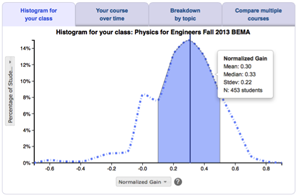
Developed by: Kathy Koenig, Bob Teese, Alex Maries, and colleagues


middle schoolhigh schoolintro collegeinter-mediateupper levelgrad school other

calc based

alg based








Overview
What? Online activities with videos of real instructors who guide students through an expert-like problem-solving process with a series of questions to interact and engage with the material.
Why? Free online materials that support personalized learning and focus on improving problem-solving abilities. IVETs can be assigned as homework to build the necessary skills and confidence for solving the more complex problems found at the end of each textbook chapter or on course exams.
Why not? The IVETs are designed for individual student use in the home setting. They could be used in recitation or studio-style classrooms if students are able to watch the videos without the audio disrupting other groups, but don't support students interacting with each other or with instructors.
Student skills developed
- Conceptual understanding
- Problem-solving skills
- Using multiple representations
- Metacognition
- Making real-world connections
Instructor effort required
- Low
Resources required
- Computers for students
Resources
IVETs can be viewed and downloaded at no cost from the developer website.
IVETs from the website may be uploaded to most Learning Management Systems, such as Blackboard, Canvas or Moodle. It is possible to link an IVET to a grade item, so a grade will be automatically entered when the student completes the IVET.
Also available on the IVET website:
- Details about the research
- Vignette Studio II. This is a free, open-source application that you can use to create your own IVETs or similar interactive online activities. Some familiarity with HTML is required. A manual, video tutorial and other helpful tools are included.
Source code for Vignette Studio II may be cloned from the project repository. Anyone proficient in programming Java can modify it to suit their own needs. https://opensource.ieee.org/rbtsps/vignette-studio-ii
Teaching Materials
Thirty IVETs spanning a two-semester algebra- or calculus-based introductory physics
course may be viewed and downloaded at no cost from the developer website.
Research
This is the third highest level of research validation, corresponding to:
- at least 1 of the "based on" categories
- at least 1 of the "demonstrated to improve" categories
- at least 1 of the "studied using" categories
Research Validation Summary
Based on Research Into:
- theories of how students learn
- student ideas about specific topics
Demonstrated to Improve:
- conceptual understanding
- problem-solving skills
- lab skills
- beliefs and attitudes
- attendance
- retention of students
- success of underrepresented groups
- performance in subsequent classes
Studied using:
- cycle of research and redevelopment
- student interviews
- classroom observations
- analysis of written work
- research at multiple institutions
- research by multiple groups
- peer-reviewed publication
References
- K. Koenig, A. Maries, R. Teese, and M. Chabot, Promoting Problem-Solving Through Interactive Video-Enhanced Tutorials, Phys. Teach. 60 (5), 331 (2022).
- K. Koenig, C. Sunny, A. Maries, and R. Teese, Interactive Video Enhanced Tutorials: A Tool for Promoting Self-Paced Learning and Engagement for Future Engineers, presented at the IEEE Frontiers in Education Conference (FIE), Lincoln, Nebraska, 2021.
- R. Teese, K. Koenig, and D. Jackson, Interactive Video Vignettes for Teaching Science, in Active learning in college science: the case for evidence-based practice (Springer Nature, New York, 2020), Vol. 7, p. 669.
- R. Teese, K. Koenig, A. Maries, and M. Chabot, Interactive online lectures for asynchronous delivery, presented at the GIREP Webinar (International Research Group on Physics Teaching), University of Malta , 2020.




